The internet in China is a strange beast. The "great firewall" is much talked about, but what does it really amount to?
First off, it should be noted that I can only answer this question from firsthand experience to such an extent. Most Chinese people do not speak English and similarly seem oblivious to the availability of free online translators. The great firewall is not about stopping access, it's about limiting access. Therefore, the language barrier has done a large bit of the government's work already. English pages are not firewalled in the same way that pages written in Chinese are. I can only presume that the English pages are given a good deal of slack in comparison to the Chinese bloggers who from time to time will actually be given prison terms for saying something wrong. However, the great firewall is still extremely visible and is a royal pain in the tuckus.
What does the firewall look like? A generic error page. There's no official Commie seal of disapproval. For Chrome it says "oops... yada, yada, yada" for Firefox it looks like the page timed out.
What is firewalled? The following is a list of the big ones which absolutely kill me.
- Facebook
- Youtube
- Pictures on wikipedia
- Certain wikipedia pages (eg: Korean war)
- Western computer component websites (tigerdirect, etc)***
- Until recently wikitravel.org
- The "cached" option on Google search
- Google images
- My news feed relating to the Arab Spring is 不好
Those are the main ones that I encounter. From there it can be pretty random. Maybe one out of ten Google results on average will be blocked. More or less depending on what you searched. But for instance there was a blog from some Jewish students in Israel called "Jewlicious" which was firewalled. For the most part you have a good idea of what will definitely hit the firewall. Freedomhouse, you're obviously going to need a VPN for. As to what might hit the firewall though, there's really no telling and it can be immensely frustrating.
The other strange thing about the internet here is that it's often slow in connecting to web pages. Yet for downloading torrents (so I'm told, of course I would never download something illegally) it's reasonably fast, like 400-500 k/s. I would be happy with those speeds, if, err, I were involved in such things. Cell phone data plans... don't get me started. My theory is actually that they sell both 2g and 3g plans, but apparently mine is a 2g which is always on edge and drives me insane.
Long story short, the internet in China is enough of a pia to be on my list of reasons to move to Taiwan. It's not really high up there, but let's just say it's on there.
As to how Chinese people think about it... that's one of those topics they're not likely to let loose on foreigners with loads of opinions. What I can say is that when I'm not going through a VPN there are lots of banner ads (in Hanzi) advertising VPNs for the specific purpose of facebook or youtube:
***The interesting thing about tiger direct being firewalled is that imo it's another instance of the protected market here. The Chinese have found a new form of non-tariff barrier. Just firewall your internet based competitors.
A friend of mine happened upon a group of American students who are in Dalian for a short period. It turns out they're paying $15,000 for a five week program. FSU's study abroad was under $5,000 and it was something like eight weeks. Another buddy of ours put it in different terms. $15,000 for five weeks is 20,000 RMB per week. Truth be told Andrew and I couldn't figure out how we would even spend that much money here. Here are some realistic prices I've paid:
headphones - 18 RMB
bottle of water - 2 RMB
Big Mac - 14.5 RMB
street food - between 0.5 and 6 RMB
lighter - 1 RMB
beer - between 10 RMB and 30 RMB (cheaper in corner stores)
rent - 2,600 RMB
taxi - 8 RMB for first 5 kilometers, 1.5 each after
bus - 1 RMB
cheese - 40 RMB
Chinese lodgings - 175 RMB
leather hat - 40 RMB
cheap pillow - 15 RMB
expensive pillow - 90 RMB
Dalian/Dandong bus ticket - 66 RMB
sit down meal - between 15 RMB and 50 RMB
tourist attractions - between 20 RMB and 50 RMB
driving range - 55 RMB
Without going to Hong Kong here's my breakdown of how to spend that $15,000 per student in five weeks in China as a school tour director
(1) private jet travel everywhere
(2) some sort of VIP arrangement at the top clubs
(3) only stay in five star western hotels
(4) western breakfasts always
(5) charter a yacht more than once
(6) complimentary tailored suit/dress for each student
(7) personal English speaking chauffeurs on call 24/7
There is a fundamental misunderstanding of China in the west. The article I've posted a link to, though actually addressing the misunderstanding, is indicative of it in that the title actually flies. My last post was speaking to the major accomplishment of the growth that China is seeing. But for the leaders of this country, doing their very best could possibly be only just enough. Consider this, what if more than half of the United States lived in abject poverty? Don't quote me on this figure, but it's something like 700 million Chinese are peasant farmers. Even in the first tier cities, Beijing and Shanghai you don't need to look very hard to find living conditions that we would consider squalor. I've seen poverty in the US, it just doesn't compare to lower class here. In a second tier city like Dalian it still permeates almost every area of town. The magnificent skyscrapers go up in the middle of this. That's the base level they're working from. Beyond the issue of a comparatively low per capita GDP there are endless other issues for them to tackle. Though incredibly illegal, corruption is endemic, sapping productivity and making governance difficult. There are no social welfare systems to speak of. Upon telling my class of teachers that Europe has free health care I literally saw a jaw drop. Medicare would be a step up. The pollution here is terrible, you literally cannot see the sky most days in Beijing. If there's a good rain the sky clears up for two or three days, but generally speaking it's kind of a yellowish gray. Once you start talking about the third tier cities the smog is choking. Most bodies of water you find are covered in algae, which apparently was not the case originally and due to pollution. People see it as acceptable to throw their trash wherever so the streets are strewn with garbage. The leadership of the country must be aware that at some point their is going to be one hell of a hangover from this regulation free business environment. For the past year or so economists have been chattering away about the property bubble here and how it dwarfs ours of 2008. They've begun test policies in a few different areas, but there are still skyscrapers being built on either side of the building I live in. The new big worry is that after the most recent ten year census it turns out that the one child policy has resulted in a fertility rate well below the optimal level. The result is that any social welfare system put in place will have to be designed to stand the impending shock that Japan's very developed, efficient and technology intensive society is having difficultly enduring. All of these pitfalls are set against the backdrop of official paranoia. The CCP is still in power because they actively learned lessons from the fall of the USSR and in lieu of ideology have made staying in power their raison d'etre. Now they're seeing 1989 all over again in the middle east. The image most Americans seem to have of Chinese leaders is of them kicking back in an easy chair, smoking a Cuban cigar and laughing as they surpass America. Far from it! After spending collectively a half year in mainland China MY image of Hu Jintao is one of a pepto bismol guzzling man who lives in a political environment fraught with imminent dangers. Under George Bush the American economy tanked. The Republicans lost power. If the Chinese economy tanks there could very well be a revolution. And if the economy doesn't tank? Well then there's still a whole host of problems which might still be catastrophic even if handled properly. Here's what Americans need to understand about China that I've learned or have learned to be extremely important factors since being here: 1. China as a whole only started working towards modernization ~15 years ago. 2. Their problems are greater in number and much bigger than ours. 3. The ramifications for them not fixing their problems are more serious and because of this they will not yield to any demands easily. 4. Their economy is still less than 1/3 the size of ours. 5. Growth like they have here requires a standard of living we would not be willing to endure. 6. We are a country of laws and not of men, this is a country of men and not of laws. The institutional stability we enjoy has not yet been engrained in China. The result is that even if we hammer out agreements with China, they might not be able to implement them. 7. China is every bit as inward focused and deaf to other cultures as the most backwater parts of America. You would be amazed at the history they're not aware of. 8. In America the mental image of China often evokes South Korea or Japan. This is completely 100% inaccurate.
I tend to do a good bit of complaining on this blog. It's primarily for two reasons. The first is that there's a tendency in the expat zeitgeist here to fee slighted. Very few of us actually speak the language. Between that, how differently things work and the developing nature of the country it leaves the community feeling isolated and quite marginalized. A lot of what circulates around in English has to do with this and it at times gives my opinions what might or might not be an unfairly negative predisposition. At the same time, the blog is just an attractive way to vent. For what it's worth there's a lot China has going for itself. If the place was all bad I wouldn't have come back, right? So it seemed prudent to go ahead and take the time to put the big compliment out there.
On my recent trip to Dandong there was a sharp juxtaposition between the Chinese and North Korean sides of the Yalu. Dandong is in many ways a very nice little place. It's clean, lively and most importantly people seem to be generally happy there. For lack of a better term, the city has a nice vibe to it. My first day there was characterized by drenching rain and a trip to a museum that was dedicated to bashing my country. Obviously that would start the trip off on the wrong foot. The second day though was a beautifully clear Saturday. Along the river front people were walking their dogs, enjoying a stroll with their families, having wedding pictures taken. Everything seemed to have a genuinely artistic flare to it as well. Not just the statues, but things like the light poles were jovially different. Later that night I accidentally happened upon a giant public park which had thousands of people dancing and playing a Chinese version of hacky sack beside neon lit buddhist pavilions. The city appeared to be having such a good time it seemed to me almost like China was trying to make the North Koreans jealous!
One of the big attractions in Dandong is the Yalu river Broken Bridge. It was one of the few surviving bridges of the Korean war. Though mostly rebuilt, at a later point the North Koreans tore down their half (at an even later point a second bridge was erected next to the original). Tourists can walk out to the end of the bridge halfway across the river to check out both the bridge's battle wounds and scope out the other side of the river through some high powered binoculars. The most interesting part was when I heard a train coming across the other bridge from North Korea into China. The conductor was blowing the horn like crazy, leaning out the window waving at us, grinning from ear to ear. All the while the engine was pulling literally one car of the open top variety which was either not that full or was empty. To the guy driving that train engine Dandong must be a glittering modern metropolis, the ultimate playground and a bastion of freedom.
Pretty much the whole point of the trip was to be able to look at North Korea, so I took full advantage of my 5 kuai and spent as much time on the binoculars as possible. The first thing one notices on the other side of the river is a very old and extremely spartan looking ferris wheel... which wasn't moving on a Saturday afternoon. It had two small construction cranes... which were empty (though it lulls late at night construction goes on 24/7 in China). There were plenty of park benches... on which nobody was sitting. The thing is that it's not like people were forbidden from going to the riverside. Some people were hanging out along the river some of whom were just hanging out, others of which looked to be mildly busy with some sort of labor. Visible buildings were badly dilapidated. Older apartment buildings in China will be similarly dilapidated at times, but river front property? Hardly! Of the handful of smoke stacks on the horizon only one was emitting something.
Which brings me to my big compliment for China. If nothing else China “makes moves”. There's something happening here, something big. It's happening everywhere I've been. The rate at which the country is modernizing is astounding. More important though is the scope of it, which is mind boggling. After driving all across the US I know firsthand that it's a tremendous amount of land. China is similarly large. The difference is that the amount of people in any given place far exceeds that at home. The population density is just silly. Yet everywhere you go, this thing, this monumental creation going on, it sort of pervades everyone's existence. My personal opinion is that there's something awry and there has to be a drawback or a catch or something involved. But even if that's the case to consider that this has been going on at this pace for fifteen years, and to realize that when I was born China was like that terrible land across the Yalu river... it's incredible.
One of my philosophies in life is that people (and by extension nations) are neither good nor evil, it is their actions which can be judged good or evil. For whatever faults there may be in the system here, the people who are building this country are doing something truly special. It's something I don't understand, probably very few people in the world understand and even fewer in the west understand. Excluding the more nefarious goals, I hope that it works out. Hopefully 100 years from now the Chinese will remember this generation of their countrymen for their achievements. The man that's on the money here isn't among those who deserve to there. The names of those people will be borne through time but whoever they are, they're alive right now*.
That's my big compliment to China.
*aside for one notable trailblazer, of course
This is North Korea:
Meanwhile in Dandong...
This is the entrance to the park. The pictures of the festivities inside didn't come out to well. Notice the neon pavilion in the upper left hand corner. The bridge into North Korea by night. It changes colors too! Notice pitch black on the other side. Dandong is lit up like a Christmas tree at night, there's even a laser.
As a rule of thumb there's two easy ways to tell a source is being partial. The first is absolutes. If someone leaves no room for themselves to be wrong and never credits the opposing side they're probably not giving you the whole scoop. The other is heavy use of colorful adjectives.
Today I went to the “Resist America Aid Korea Memorial Hall”. Chinese museums sometimes pleasantly surprise me. Despite having the other side's slant on things you get a fairly accurate play by play more often than one would think. This was not the case today. The “Resist America Aid Korea Memorial Hall” was the most propaganda laden experience I've had in China so far. The place has had money lavished on it as the facilities are quite imposing. Sadly the English translations were incredibly poor and there were often times when the BS was easy to see through. One instance was a section of the museums devoted to American mistreatment of POWs and how the Chinese were beneficent in their treatment of our own soldiers. One photograph claimed that US forces tatooed degrading statements onto Chinese prisoners. There was one problem with this claim. The tattoos were in beautifully scripted Hanzi. A little bit of rooting around online (through a VPN of course) showed that this tattoo was the result of violence between communist Chinese POWs and non-communist Chinese POWs who had been forced into service.
The best example of the propagandist nature of the museum was a placard reading “the Chinese never took a single needle or thread from the Korean people”. Granted, this was the name of their policy but, a single needle or thread? They also claimed that China sent 2.9 million people into Korea between 1950 and 1953. Out of 2.9 million soldiers is it really plausible that there wasn't a single person who once took something as insignificant as a single sewing needle without permission?
The thing about the US is that in our education system, our TV programs and our museums we at times find fault in ourselves. It's a good thing. Admitting one's own problems allows for introspection and hopefully avoidance of past mistakes. In this museum they were always talking about how the Chinese were winning battles, gloriously wiping out the enemy, annihilating the “UNC”, so on and so forth. Losses never factored in. So my question is that if the PVA was only doing winning why are there still two Koreas?
So right now I am en route to a town called Dandong (at the time of writing, at the time of posting I'm physically in Dandong). The reason why I'm going to Dandong is essentially because it's as close to North Korea as you can get without actually going to North Korea. While it's possible for an American to go to North Korea these days it's not a regime I want to support with tourism dollars. Truth be told, knowing that some of the money spent on this excursion will find it's way into the DPRK leaves me with not such a great feeling. All that aside the question remains, why?
One of my motivations is the simple, why not? I've already traveled to the opposite side of the planet and was within a stone's throw of one of America's few remaining bone fida enemies. Thanks to my experiences here, when reading about China it gives me perspective on things. And at times in lieu of perspective it has provided me with actual images for the place in question. So at the very least there will now be a handful of actual images to go along with North Korea. What will be available to see isn't exactly clear just yet, but there are definitely vantage points in Dandong from which to view the hermit kingdom. Sadly I didn't do the DMZ tour in South Korea to match. That opportunity will probably come again though.
The real impetus here however is that the current plains entail leaving mainland China if not in short order then in reasonably short order. Mainland China isn't as straightforward as the press would make it seem. It's very much a place in transition, and it's ideological roots still factor into society here in a major way. Remember, a handful of development zones aside, China has only been opening to the world since the 1990s. It's going to be immensely interesting watching over the next twenty years, but I don't particularly like being a de facto part of a non-democratic society and I don't like being a part of a country that (from what I'm told) sees my own as it's enemy. When in a strange land the bond between you and your own countrymen becomes a great deal stronger which in turn is a multiplier for the outsider effect. It's a strange feeling. So despite the fact that there's something big playing out here and though I hope the best for these people my being in this place just doesn't feel right. As a result this could very well be my last chance to catch a glimpse at this side of North Korea.
There's also something about proximity I think is cool. DC is one of my favorite places in the world (Colorado Rockies FTW). Virginia/Maryland is beautiful, the historic sites are cool and the vibe is up my alley, but being where decisions are made absolutely blows my mind. I honestly got a huge kick just walking by the Federal Reserve. So this is the same thing but on kind of the opposite level I suppose.
Another important factor is the traveler's bragging rites. Talk to expats and you start hearing about the hunger for stamps. It's a group of people that want to fill up their passport just to say they did it. Traveling is an end in and of itself. DPRK is knockout stamp but one I don't want. That being said, having gotten as close as you can get without actually crossing in is worth probably worth like a quarter stamp in bragging rights. Before leaving China I also plan on scoping Urumqi, which also has to be worth like half a stamp.
Lastly, I thought the venture was going to be much easier. It was a brutal train ride. Barring an exceedingly cool next few days and remarkably easy bus ride back I would have opted for a different trip.
So, the past month or so I've been thinking that my Chinese studies have been going very badly. Up until earlier today that is. Over the last three weeks I've slowly been coming to the conclusion that the best meter by which to judge myself might not be the class average. For a while I held out grand hopes that somehow I would mount a miraculous comeback and overtake most of the class. As it became clear that my study habits weren't actually that poor and that my further capacity was limited, disillusionment set in followed by anxiety regarding future plans. Today two things happened. The first was that for a brief moment I angled my computer screen to see the reflections of my western compatriots (my seat is toward the front of the class). Both of them were just as lost. The real kicker though was that later in the day my friend told me that apparently the Asians in the class DON'T STUDY. Maybe it was a little racist of me, I had assumed that because the rest of the class was Asian my study habits weren't on par. It turns out the language simply comes much more naturally to the Koreans and Japanese.
That being said, the idea that I might not be absorbing all that's possible still haunts me. While the volume of my studying is probably sufficient the efficiency of it most likely is not. Put me in front of a research paper and it's a done deal. I have a set system for researching the topic, formulating an opinion, taking notes, cataloging information then writing and citing the paper. Ceteris paribus my 30 hours of effort will be of a higher quality than that of the average student. There's a learning curve to learning, and taking on a new a language is something I've never done before.
Characters: While there is some logic to written Chinese there's not a whole lot. Most characters are constructed of multiple basic characters called “radicals”. If you knew the background for why person + wood = rest it would be easier to keep track of them. I assume all Chinese school children understand the back stories for most Hanzi characters. However, even if you did know said explanations the characters say nothing about the way to pronounce the word they represent thus establishing a disconnect that must be overcome. Oh, and did I mention most people consider literacy as knowing 1,500 characters?
Tones: “Ma” with the first tone and “ma” with the second tone mean completely different things. There are instances when the person you're speaking to can pick up the meaning through contextual inference. Sadly much of time this isn't the case. Again, the writing tells you nothing about the tones. It's necessary to memorize them through the pinyin (what Google calls the romanization of characters) and then connect that to the characters. The tone of a word can also change in certain circumstances given a particular tone in the word before or after it.
Similar sounds: Take “shi”. First off there's “shi”, “xi”, “chi”. All basically sound like “shi”. That's before incorporating tones. It's remarkable how the tiniest cadence can completely transform a word. After months of being here and going to the same place five days a week I still consider it lucky when I can tell a taxi driver Liaoning Shifan Daxue. Even when it does work the way it plays out is, they look a little confused before it clicks. Then say "ahhh", followed by the exact same thing that I said and then they try to correct me by saying, again, the exact same thing that I said but very slowly. Listening is a bear as well, but frankly I'm just not advanced enough to be thrown into that lions den quite yet.
Overlap: Biǎo (表)means exterior surface, a model, a table, a form, a meter, family relationship or a watch. Biǎo (裱) means to hang a paper or mount a painting. Biǎo (婊) means a prostitute. For some reason in Chinese there are vastly more instances where more than one concept is attached to the same word, and usually more distinct concepts are attached as well. Don't get me started on “shi”. With Koreans if you don't know someone's last name (though technically last names come first in Asia) and want to take a stab at it go for Park, Kim or Lee. I'm tempted to say in Chinese if you don't know a word just dub in “shi”. Once you factor in this overlap along with similar sounds and the tones, what a westerner would percieve simply as "shi" could easily mean over 100 different things. That being said, wome the difficulty in this overlap might be in part due to the next, most oft overlooked and possibly largest issue in learning Chinese.
NO CULTURAL CONTEXT: In my opinion, understanding the multiple usages of words and makeup of Hanzi characters would be a lot easier if one were raised in China. The manner in which they go about explaining concepts either through spoken or written language is just an entirely different thought process. Open a door and turn on a light for instance are the same word Kai1. That kind of makes sense. But then again I constantly run across a string of characters which I recognize but make absolutely no sense to me when combined. Ask a Chinese person or pop them into the translator and a concept which seems entirely distinct from the original three characters is the answer. A lot of things that don't make sense might if raised here. It's a matter of making connections.
For instance, one of my cars is a 1983 Mercedes. Prior to that vehicle I had owned only American cars. The way things were done on the Benz originally made little sense to me. Problems stumped me easily. After years of ownership I now have an intuition when working on it in the same way I did with my old Cadillac. There way Mercedes engineers collectively think is different from the way GM engineers collectively think. There's an overall intangible logic to the way things are done. It's the same with language. Once you get it things are much easier. Sadly language is an organic and quite fluid construct and therefore much more difficult than a car.
The most oft asked question people throw my way is “how do you learn/teach a language when one party doesn't understand the other's native tongue?” This will be a pretty quick blog because in large part it's one of those “you've got to be there” sort of things.
My Chinese classes and the classes I teach are completely different for a few reasons. The first is the discrepancy in proficiency. The English classes I teach are of either teachers (who are intermediate to advanced) and the better middle school students of Dalian (who are largely advanced). Both can get their points across on the by and large. In those classes I focus on vocabulary building. I give them words and explain the concepts behind them with simpler words or with adjectives I also act them out. The second discrepancy is the age range. The teacher training courses follow the middle school courses (mostly because I'm only so vested in it) so both are a little juvenile. I play games with them and act like a clown a good bit of the time. Another is that in the English classes all of the students are Chinese. In the Chinese classes there are Koreans, Japanese, Russians and Westerners. The first three have limited English abilities.
So how the Chinese classes work... basically at this point they go for low hanging fruit. Most of the things the teachers get across are simple concepts. There's a lot of simple vocabulary and basic question and responses. The main way we learn what a word means is either through them pointing or mimicking or through the book book which is in English and Chinese. The teachers generally speak a tiny bit of English and once in a blue moon will use it but as a rule do not. One big thing they like to do is have the students simulate conversations. The new one is pairing people into groups and then instead of repeating what's written in the book have us just “talk” about things, for instance where the office is located. There's a lot of “repeat after me” and “what's this I'm pointing at”. For Hanzi (the characters) she makes us get up to the blackboard and write them out. The western world is losing that battle progressively worse and worse. Watching the Asians do it is mind blowing. So essentially, the Chinese classes don't work very well. As to how it would work out at a more advanced level I can't say. It seems like it would be more like the classes I teach where I can use simpler English words to describe the more advanced ones.
In my opinion the best way to learn Chinese would be to come here with a few years experience under your belt and take classes in a study abroad program with an American university for a little bit and only after that to jump into the deep end. FSU's teachers at TFSU spoke immaculate English. Any time we had questions they could answer it. Asking questions is the essence of learning. That being said, I still feel it's possible to pick the language up this way, just exceedingly difficult. This is opposed to at home, where it would be impossible in my estimate.
As to the English classes, most of them are not graded. My take on it is that you're there to give them experience with native speakers but you're not really a full on teacher. The school system recognizes that teaching someone a language when you don't know their native tongue is exceedingly difficult. So the answer to the question “how do you teach someone a language without knowing theirs?” is: “with great difficulty”.
Here's an interesting way to entertain yourself for about five minutes. If you don't have Google Chrome you'll need to download it for this (IMO blows firefox out of the water anyway). When I go to ebay.com without going through a VPN it redirects to ebay.cn. Google Chrome has a nifty feature wherein it automatically translates web pages that are in foreign languages. The result... it's completely different. Ebay.cn is full of advice on how to set up a seller's account and how to engage in international trade. If you search for something like "Mercedes" (别克) the only results that come up pertain to selling. There are 0 listings on ebay.cn for anything from or for Mercedes. None. Or for Audi, which is an IMMENSELY popular car here.
What does the west have to offer China in terms of trade? Clearly the service sector, they need Microsoft Windows and KFC. In terms of manufactured goods though little things like a wooden shift knob for a Mercedes that might have been produced in Germany but not China could help in terms of trade balances. So why don't we see something like that? There are a lot of Mercedes cars in China. Am I really to believe that there is not one entrepreneurial German car guy who is savvy enough to sell second hand Mercedes parts to Chinese the way they do to Americans? American Mercedes fanatics eat that stuff up. Euro version tail lights and that sort of thing fetch big bucks.
So as an Westerner you log onto ebay and half of the stuff is shipped directly from China. You order it, shipping is something like a couple dollars and it shows up within a few days. Yet in China ebay only barely function as a place for Chinese to purchase things they might not be able to find at home (after enough hunting around you do eventually find yourself in the us ebay version). Chinese ebay is just a symptom but a startling one.
|

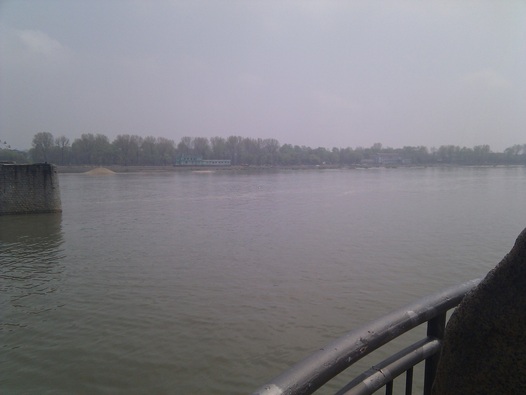
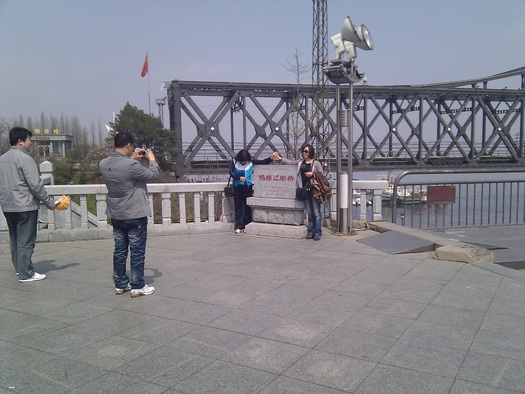
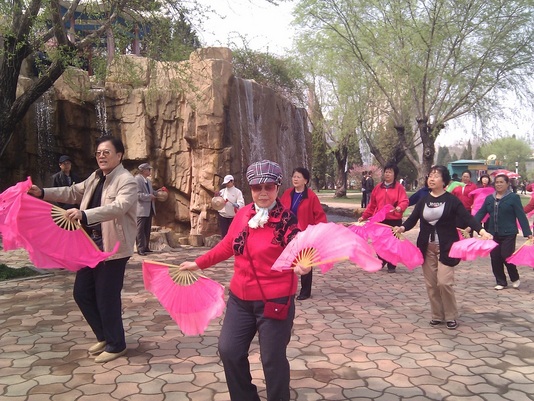
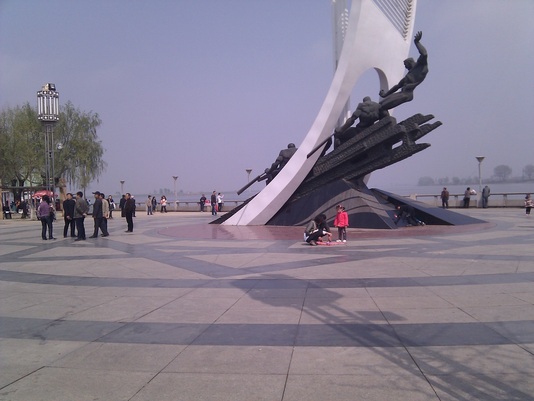
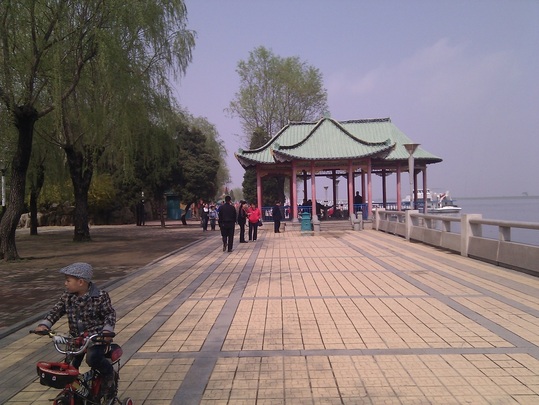
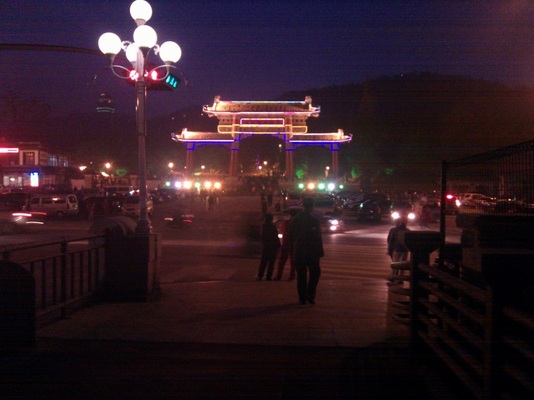
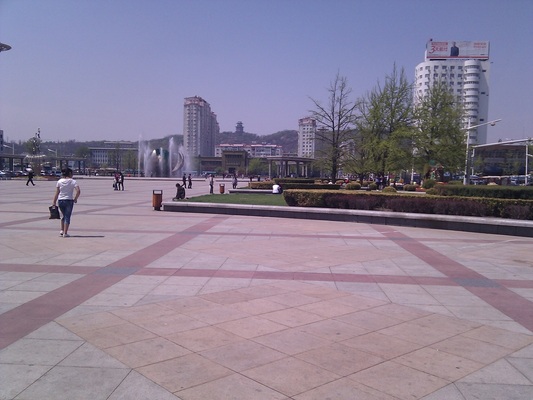
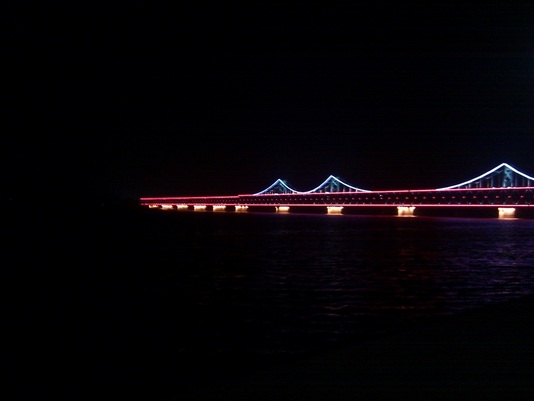

 RSS Feed
RSS Feed